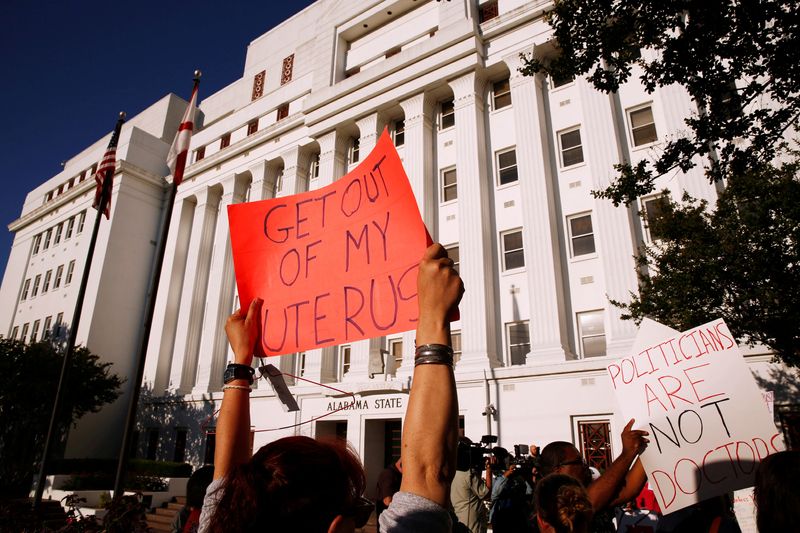Roe v Wade ruling disproportionately hurts Black women, experts say
2022.06.27 13:26
4/4

FILE PHOTO: Pro-choice supporters protest in front of the Alabama State House as Alabama state Senate votes on the strictest anti-abortion?bill in the United States at the Alabama Legislature in Montgomery, Alabama, U.S. May 14, 2019. REUTERS/Chris Aluka
2/4
By Nandita Bose
WASHINGTON (Reuters) – The U.S. Supreme Court’s decision to overturn a woman’s constitutional right to an abortion is expected to have a disproportionate impact on Black women and other women of color, who have traditionally faced overwhelming costs and logistical obstacles in obtaining reproductive healthcare, experts said.
The reversal of Roe v Wade leaves the decision of whether or not an abortion is legal in the hands of state governments. While some states have recently reaffirmed the right to an abortion, 26 states are likely or certain to ban abortion in most or all circumstances.
More Black women live in states that will ban abortion and those living in southern states – with the most restrictive laws – will bear the brunt. For example, Black people make up about 38 percent of Mississippi’s population, according to recent Census data, compared to about 13% of the U.S. population overall.
Black women in the United States are five times more likely to have abortions than White women, while Latina women are twice as likely, according to 2019 data from the Centers for Disease Control and Prevention (CDC).
Health experts trace the relatively high rates of abortion among Black women to disparities in access to healthcare, including lack of health insurance and contraceptives in underserved communities.
In Mississippi, Black women accounted for 74 percent of abortions in 2019, according to the Kaiser Family Foundation.
“There is no denying the fact that this is a direct attack on all women, and Black women stand to be disproportionately impacted by the court’s egregious assault on basic human rights,” said Janette McCarthy Wallace, general counsel for the National Association for the Advancement of Colored People (NAACP).
If more Black women are forced to carry pregnancies to term, there will be a disproportionate increase in deaths of Black women in childbirth, a study from Duke University finds.
More American women overall die of childbirth every year than in any other developed nation, according to the White House. And Black women in the United States die in childbirth at a rate three times white women, data shared by the White House show.
A full abortion ban could further increase Black maternal deaths by 33%, compared to a 21% increase for the overall population, the Duke study says.
The Supreme Court ruling “marks the beginning of a new public health crisis for Black women,” said Michelle Webb, chief communications officer of the Black Women’s Health Imperative, a non-profit focused on improving the health of Black women.
LONG-TERM FINANCIAL DISTRESS
Women who are forced to have an unwanted baby are more likely to be in poverty and experience financial distress for years afterward, with higher rates of evictions and bankruptcies, research including a 2020 paper https://www.nber.org/system/files/working_papers/w26662/w26662.pdf published by the National Bureau of Economic Research shows.
When a woman is not able to obtain an abortion, the psychological impact of such an action hampers productivity, it said. Women also face medical costs associated with prenatal care, birth, postpartum recovery in addition to costs associated with raising a child that typically exceed $9000 a year, the research showed.
“Abortion rights are economic rights,” said Heidi Shierholz, president of the Economic Policy Institute. “This decision means the loss of economic security, independence, and mobility for abortion seekers,” she said, which will impact women of color the most.








